
by Balkaninvest-Team | Jun 10, 2015 | Messeauftritt, Personal @en
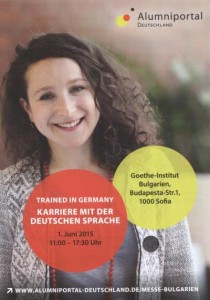
On 01/06/2015 the Balkaninvest team had an exhibition stand at the career fair “Trained in GermanY – career with the German language”. Organized by the Alumni Portal Germany, the event took place in Sofia in the premises of the Goethe Institute Bulgaria.
This career fair should address German speaking Bulgarian professionals as well as recent graduates. A total of almost 150 interested people took the opportunity to network with various business representatives of German employers or other alumni and made sure that the career fair was a huge success.
Well-attended Balkaninvest exhibition stand
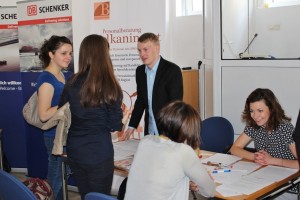
The Balkaninvest-Team made valuable contacts – and welcomed more candidates than expected.
The Balkaninvest exhibition stand was well-attended by the visitors of the career fair. With our freshly printed banner and various information materials about job offers and our recruiting agency we were able to attract many interested visitors and conduct many interesting conversations.
But not only Germany alumni visited our stand, also other exhibitors were visiting us for a coffee and small talk. So we were also able to establish new business contacts.
Balkaninvest-competition was a big success
During the fair, we carried out a prize competition at our exhibition stand. Three out of all participants were able to win a voucher for a simulation of a typical job interview with a German employer in our Balkaninvest office – including a written evaluation and suggestions for improvement (with a total value of 149 leva).
Prior to the event we had advertised our prize competition on different channels – with huge success. About 60 interested people took part in our prize competition – a resonance we did not expected. The three lucky winners will be notified through e-mail in the mid of this week.
Fair offered interesting branch mixture
In total, twelve companies of different branches presented themselves at the career exhibition. Besides Balkaninvest the ACO Severin Ahlmann GmbH located in Büdelsdorf in Schleswig-Holstein and companies such as DB Schenker, Lidl or the Lufthansa Technik took part at the career fair.
Reiner Itschertl of Goethe-Institut Bulgaria, Marcus Haas of German Embassy in Sofia, Carmen Struck for the German-Bulgarian Chamber of Commerce, Marie Fessel of the DAAD and Maria Endreva representing the German Alumniportal gave short speeches during the official opening of the event.
Get together a worthy conclusion
The organizers of the fair arranged an amazing catering offer for visitors and exhibitors. In addition to juices, coffee and water, cakes, cupcakes and sandwiches were offered. At the end of the exhibition companies and German alumni were invited to a glass of red wine and a “Get together”.
All in all, it was a successful and professionally organized event. We had great conversations, met a lot of nice people and are looking forward to meet all of you again at the next fair.
More pictures:
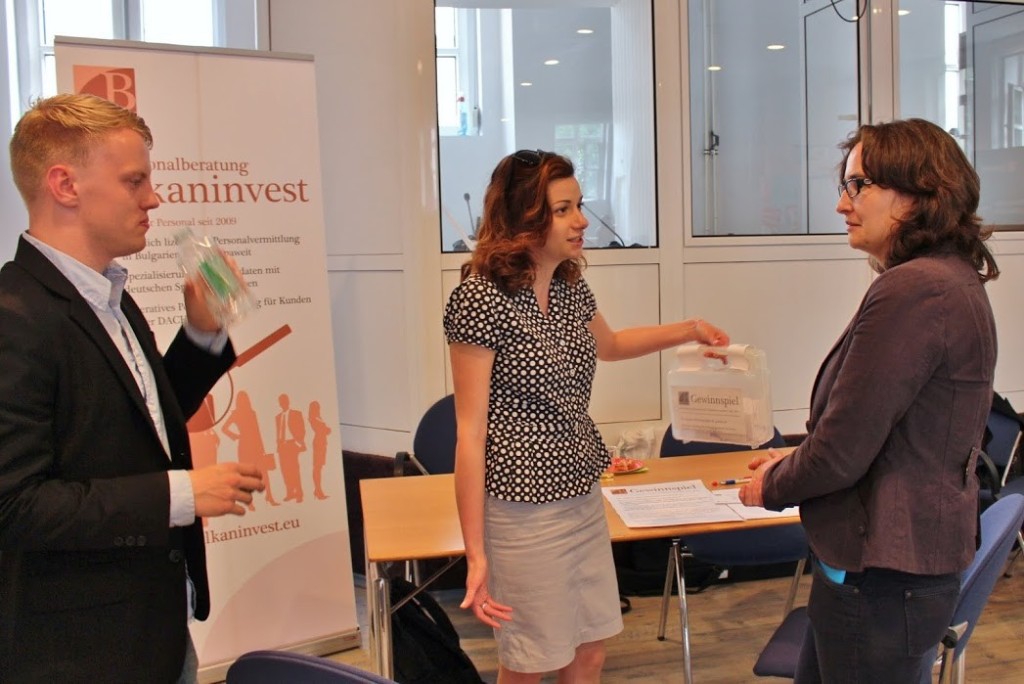
Our Team in discussion with organizer Maria Endreva.
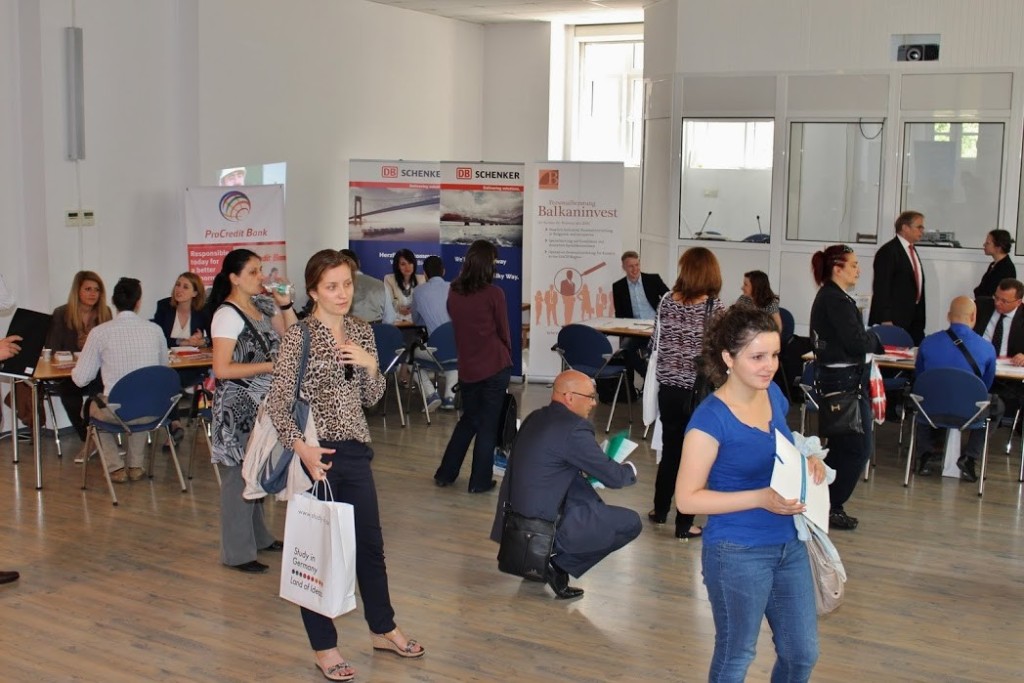
Numerous attendees found their ways to the Goethe-institute in Sofia.
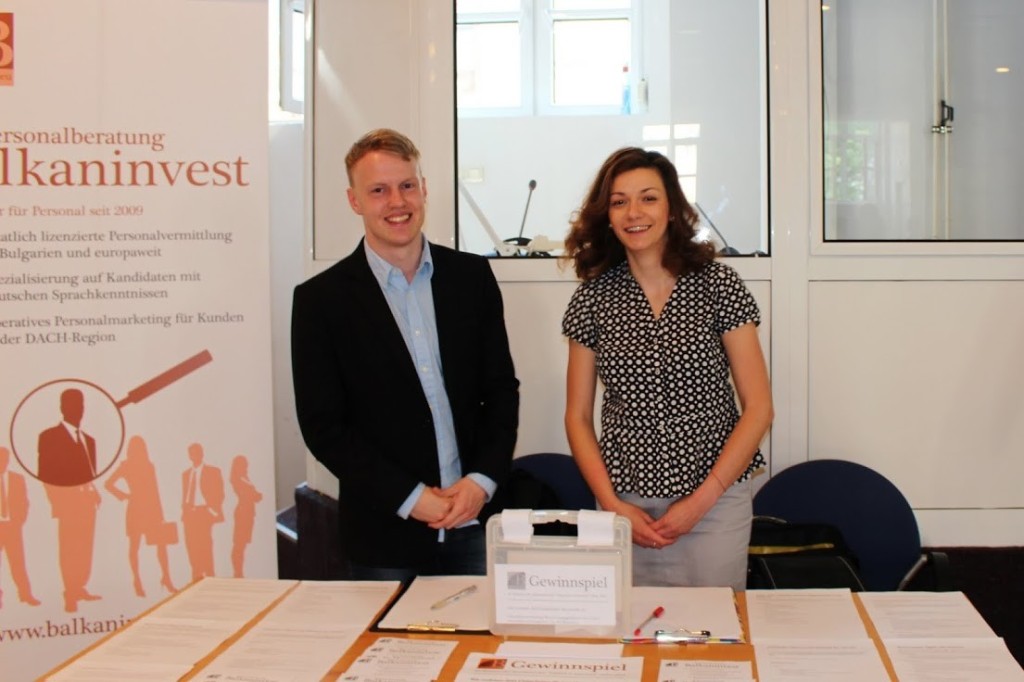
Keep smiling: Our team in action.
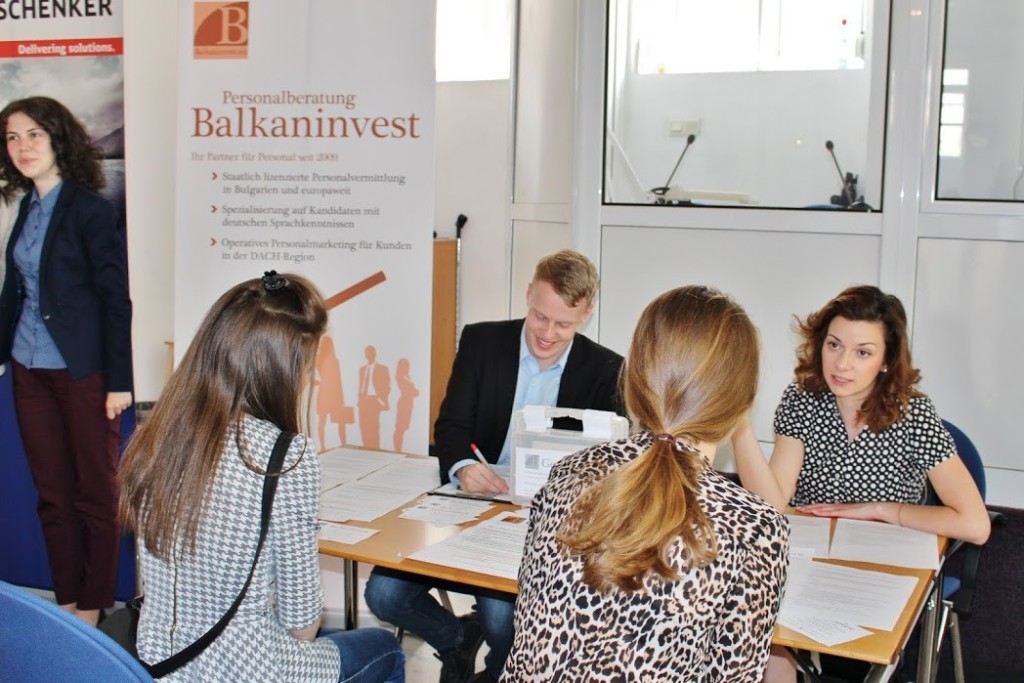
Interviews with Balkaninvest

by Balkaninvest-Team | Jun 8, 2015 | motivation and employer branding, Personal @en
As part of our new regular series “Employee Motivation as a part of Employer Branding” we would like to illuminate the two best-ranked aspects of the 2015 “work motivation” study by the Manpower Group – a good working relationship with colleagues and superiors as well as flexible working hours.
The most important factor for employee motivation is a good relationship with colleagues and superiors. In the study, 65 percent of the respondents said to be more motivated if they get along well with colleagues and superiors. Even though the percentage is lower than last year (77 percent), a good working relationship is still considered to be the most important motivating factor.
Pierre Bourdieu influence on the theory of social capital

Pierre Bourdieu “in action” (Photo: alicia gaudí @flickr.com, creativecommons.org/licenses/by/2.0/)
The most famous scientific theory about the positive motivational influence of good relationships between colleagues and superiors is the theory of social capital by the French sociologist and social philosopher Pierre Bourdieu. Social capital describes the collective benefits of social relationships between different people, in the case of a company the relations between employees and superiors.
Building social capital requires a high level of trust for giving support, assistance and recognition to others and to establish cooperation. All these characteristics and a high degree of trust lead to a strong intrinsic motivation of the employees and to higher motivation. An employee who does not feel well, is not a good worker. Real friendships between the employees are not necessary but social capital promotes a pleasant and helpful working environment, which leads to collegial relationships and long-term retentions of employees.
Flexible working hours an important motivating factor
The study “Working Motivation 2015” by the Manpower Group Germany named flexible working hours as the second most important motivating factor for employees. Overall, 50 percent of the respondents had the opinion that flexible working hours are an important motivational factor. In the previous year, only 67 percent of the respondents concurred that flexible working hours have a positive influence on employee motivation.
But even though flexible working hours can be found on almost every job advertisement as an incentive, researchers at the University of Minnesota came to the conclusion that flexible working parents have no significant time savings. It means, in particular, that workers can not afford more time for their children. Flexible workers have just more time for themselves and feel less stressed, which is beneficial for their own well-being and their own motivation.
Happy workers positive for corporate image
Good relationships with colleagues and supervisors as well as flexible working hours increase the motivation and commitment of employees and affect the long-term retention of employees in a positive way. In addition, happy workers like to share their positive experiences within the company and thus communicate unconsciously a positive corporate image.
In the next part of our series “Employee Motivation as a part of Employer Branding” we will discuss the aspects “friendships with colleagues” and “free drinks for employees”.

by Balkaninvest-Team | Apr 14, 2015 | Europe @en, Personal @en
According to a study by the Staufenbiel Institute in 2015, German employers are optimistic towards the developments in the labour market for graduates. Even though a decreasing number of companies expect an increasing need for graduates compared to the last years, pessimistic forecasts for most disciplines are an exception.
In 2015 particularly economists are in demand. For almost 45 percent of the offered positions, of which half are positions for internships, graduates with an economic background are needed. 3% of the companies forecast a rapidly growing demand for economists for the next five years.
Increasing demand for engineers and computer experts
Compared to the previous year the forecast for the demand for engineers and computer scientists is slightly less optimistic but still positive. For engineers, 35 percent of the employers (2 percent less than last year) expect a rising or significantly rising demand. Over the next five years, this amount will rise up to 63 percent which means a decreasing tendency in comparison to the forecasted increase in demand last year (68 percent).
The predictions for IT graduates remain nearly unchanged compared to the previous year. 38 percent of the companies expect rising and 8 percent significantly rising demand. The job prospects remain bright in the future: 51 percent of the companies expect an increase and 51 percent a strong increase for the demand of computer scientists.
Focus on interns
Almost half of all graduates jobs are provided for interns (44 percent). 6% of the jobs are for trainee programs and 18% for young professionals. The remaining workplaces are split up between graduates (27%), clerks (3%) and associates (2%).
In computer science, the distribution focuses less on internships (35%) but more on young professionals (31%). Workplaces for engineers are offered especially for interns (43%) and graduates (29%). Trainee positions are for IT graduates (4%) and engineers (3%) less frequently offered.
Employers prefer Master’s degrees
Inside application processes primarily Master’s degrees are preferred. 90% of the companies favour this type of degree over a University Diploma (76%), a University Bachelor’s degree (60%) and a Diploma of a University of Applied Sciences (55%).
This tendency can be also detected for engineers and computer scientists. 97% of all companies prefer engineers with Master’s degrees and 92% prefer IT graduates with Master’s degrees. The Diploma of a University of Applied Sciences in Computer Science (54%) and Engineering (63%) is clearly preferred over a Bachelor’s degree. A Bachelor’s degree in Computer Science is preferred by 47% and a Bachelor’s degree in Engineering by 36% of the companies.

by Balkaninvest-Team | Dec 16, 2014 | Europe @en, Personal @en
With the beginning of 2015 Germany introduces for the first time in its history a general minimum salary. Until now Germany was one of the few European countries without such a standard. Employers are obliged to pay their employees an hourly gross salary of not less than 8,50 Euro beginning in January. According to calculations of the German government about 3,7 Million people are currently earning less than that and will benefit from the new legislation.
The minimum wage will be attuned to the salary level development on the German market on a regular basis by an independent commission with members from both labour unions and employer organization.
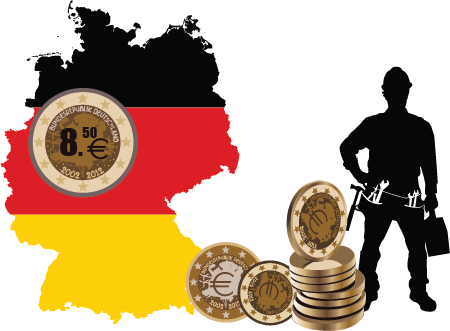
Minimum wage in Germany from 2015
Minimum salary valid for Bulgarians
The new minimum wage will cover all employees that work in Germany, no matter what nationality. Furthermore, also foreign companies have to comply with the requirements of the minimum salary law (with the official, not very reader-friendly name “Tarifautonomiestärkungsgesetz”) and pay their delegated staff at least the defined hourly salary of 8,50 Euro. This can be the case e.g. for Bulgarians that are send to Germany to do services – but working on a Bulgarian labour contract.
Correlation with Arbeitnehmerentsendegesetz
For several business branches a minimum salary is no news at all: The Arbeitnehmerentsendegesetz-law which was introduced in 1996 and fundamentally revised in 2009 defined minimum wages for several industrial sectors such as construction, cleaning, and health care.
The Arbeitnehmerentsendegesetz is binding for foreign companies once they are active on the German market. As the name indicates the intention of it was to avoid dumping competition of foreign companies that pay wages below German standards to their employees. The minimum wages vary depending on the particular industry but are in general higher than the newly introduced general minimum salary. In case that one of the defined rates is higher than the 8,50 Euro, employers will have to continue to comply with the well-known Arbeitnehmerentsendegesetz and transfer remunerations above the 8,50-threshold.
Accountability of companies under new minimum wage law
The new Tarifautonomiestärkungsgesetz which regulates the minimum wage points in its §14 “Accountability of purchaser” to the respective norm of the Arbneitnehmerentsendegesetz which is to be used here as well. Accordingly companies bear responsibility if other companies that fulfil service contracts for them violate the minimum wage norm. They may be charged for malpractice of sub-contractors with administrative offence of up to 500.000 Euros per case. It will be highly advisable that companies avoid this risk by including rights of exemption in their contracts with sub-contractors.

by Balkaninvest-Team | Nov 6, 2014 | Personal @en
The Social Network Facebook has gained a size that cannot be ignored any more. Its well above 1,32 Billion users share more than three million likes – every minute! The following infographic illustrates the most recent numbers that show, how important Facebook has become for social recruiting.
Infographic Facebook and Recruiting

Infografik Facebook Recruiting
Where as some recruiter see Facebook as a bit dodgy (in comparison with career networks such as LinkedIn or XING), others have recognized its value, in particular to communicate an employer brand externally and internally. And even for direct recruiting Facebook can offer a lot, in particular if you are familiar with its powerful search functionalities.
How German recruiters apply Facebook
As the infographic illustrates currently 15 percent of the 422 HR -professionals that participated in the survey from January 2014 are already exploiting Facebook for career websites. Twelve percent use it occasionally and three percent for special positions only.
Who wants to reach out on Facebook has to use its paid Facebook ads, like it or not. But only six percent of the participants make us of this way to shuffle visitors to their Facebook career website on a regular basis, with eleven percent at least from time to time and another two percent for special positions.
It becomes pretty clear that the use of Facebook in recruiting has a lot of potential in it. Although one has to note that Facebook is no more growing that rapidly in Germany in sheer numbers if at all. But its enormous size is a factor for the internet, and it will be like that for the near future. Innovative recruiters recognize this – and get engaged!

by Balkaninvest-Team | Feb 5, 2013 | Economy @en, Europe @en, Personal @en
The publication of an OECD report on the immigration of foreign workers to the German labor market has prompted keen media interest over the last few days.
After we reported only last week about the lack of sufficient interest of German IT companies to searching for qualified staff abroad, we are now presenting a comprehensive economical study of the OECD (Organization for Economic Co-operation and Development).
The study describes that the access to the German labor market as relatively easy (compared to other OECD member countries). Yet numbers suggest that in Germany, in spite of the alleged shortage of skilled workers, the market share of labor migrants from outside the EU and the European Free Trade Area (EFTA) accounts for a fifth and even tenth of the share of other studied countries such as Australia, Denmark, Canada and the United Kingdom.
SMEs account for considerable difficulties with migrant workers
The situation with Small and Medium Enterprises (SMEs) could be described as problematic. These types of businesses often encounter serious difficulties in finding suitable staff from abroad, which is apparent from the graph illustrating the results of the surveyed companies. .
Indeed, the shortage of skill workers is far more common in SMEs than in larger firms,
In contrast to big companies, SMEs have no international intercompany personnel exchange to facilitate recruitment of expat employees.Therefore the report recommends employers – especially SMEs – put more effort into looking for qualified personnel aboard if they cannot meet their need for skilled workers on the local labor market, the OECD says.
One of the many explanations of the problematic situation is that both at home and aboard the German immigration system is perceived as restrictive and difficult to access, argues the OECD report.
OECD recommends coining of an immigration strategy
Yves Leterme, Deputy Secretary-General of the OECD, advised for a consistent immigration policy during the presentation of the study on 4 February 2013 in Berlin. Without such an approach, meeting the projected shortage of skilled workers would be difficult: ‘The prosperity of Germany is largely dependent on whether it will be able to stay competitive despite its aging population.’
Read the full OEDC study ‘Immigration of foreign workers: Germany’ by clicking on the PDF thumb below.










